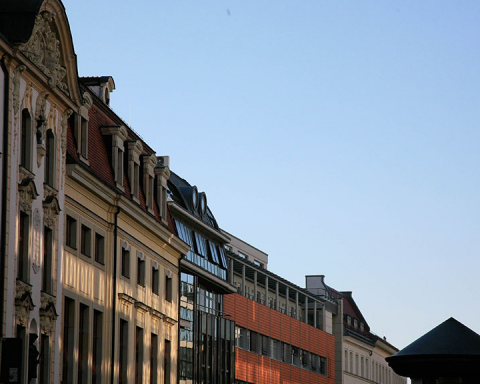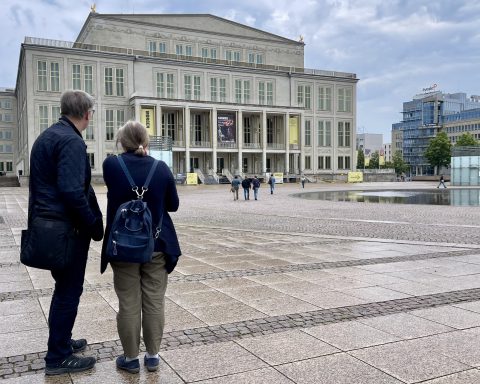- Wednesday, February 10, 1999
“Do you have time?”, she asks ambiguously, the friendly but pleading tone perfectly complementing her difficult situation.
I am on the way back to my apartment in my new hometown of Leipzig when I happen upon her: an elderly woman balancing precariously on her cane, afraid to go further upon the icy, uneven path. Stranded and in need of a way out, preferably not at the price of her dignity.
Her question catches me off guard as I move to pass her. I stop and am momentarily confused, thinking that she wants to know what time it is. As she waits for an answer, I realize that she really wants my help.
“Time for what?”, I ask.
“A short walk perhaps?”, she suggests, her steady tone betrayed by the onset of panic in her pale blue eyes.
When I nod in agreement, her body visibly lightens as she straightens and slides her arm through mine. We have walked a few meters in silence when, with the disarming directness that appears to be one of the few privileges old age bestows, she asks, “Are you a boy or a girl?”
“A man,” I answer. She smiles, only momentarily embarrassed by her uncertainty.
“Of course. A man.”
We slowly circle the large, snow covered lawn in front of her 1960s-era prefabricated apartment block. She thanks me for my time in a thick Saxon accent which I need to struggle to penetrate.
She explains how she likes to get out, but never does. Her leg, you know. Unprompted it spills out . . . Fresh air is so good for you, but her family is busy and doesn’t come often. All her friends have moved out or died. She just needed to get out today, but it’s so icy! . . . “But to think that you stopped and we’re having a walk! Once more around?”
Why not? As we make the circuit a second time I realize that her firm yet brittle grip and her fur coat bring back pleasant memories of ushering my own grandmother from the car to the church on Christmas Eves past. I explain that I’ve come from Canada to teach English, have just arrived, that it’s nice to meet someone and get to practice my German.
She stops briefly, raises her head to look at me in amazement, “Canada!?” But after punctuating her disbelief with a quick shake of the head, we’re moving again.
In the dimming late afternoon light I point out my building, a newly renovated neo-classical apartment block from the Weimar era. We’re neighbours, but our flats couldn’t be more different. She nods and tells me that she watched the renovations take place over recent months. “A very noble address,” she says. “It must be expensive.”
“1,200 DM,” I answer. Her eyes widen, but like an actor bored by a familiar role, it clearly takes some doing. After ten years in a market economy, even the elderly have adjusted to the prices.
At the end of our second lap, she inquires as to whether I would be so kind as to accompany her upstairs. Curiosity piqued by the conditions in a typical GDR flat, I readily agree and she sends me on ahead to open the door.
At the top of the entrance steps, I stand holding the door and watch as, hands gripping the railing, she ascends the six steps as if each were a separate stage on Everest.
Once inside, the matriarch of a departing family greets the old woman with a perfunctory “Guten Tag”. The passing faces of the husband and wife suggest an interest in who I am, but not enough to override the Golden Rule of modern apartment life: Mind Your Own Business.
We take a brand new elevator to the fifth floor where, after she spends some time fiddling with the lock on a door labeled with her last name “K.”, we enter the flat. Once inside the narrow hallway, I’m immediately hit by an odor recalling a mixture of mothballs and mold which sit atop a sticky warmth that, even after having just been outside in the crisp winter air, is already overbearing.
As we shed our coats, I get my first real look at my walking companion. She’s about five feet tall and her body has the puffy appearance of a stuffed animal. The oval face is dominated by the pale blue eyes which sit beneath a pair of glasses whose plastic frame is decorated with a pattern of multi-coloured specks. Her lips are thin, but often break into a ready smile.
Before ushering me into the living room, she pauses in front of a full length mirror in the hallway to unselfconsciously comb her gray hair into a part, just left of centre. Once in the living room, she directs me to take a seat in one of two matching swivel chairs. Covered in maroon and black pleather and featuring an austere design, they could charitably be labeled “GDR modern”, a style which appears not to have taken into account matters of aesthetics, quality or comfort at any point from design to manufacture.
I look around and see that the walls are decorated with fairly typical bric-a-brac: one features a tiny shelf holding a vase containing a plastic red rose, another has several small, framed prints of non-descript landscapes while over a large recliner hangs a memento from a trip to “Berlin – Capital of the German Democratic Republic” in the form of a brown plastic disc in wood grain onto which has been mounted a gold-painted replica of the Brandenburg Gate as seen from the Eastern side, the GDR flag unfurled over the Quadriga sculpture.
Seated, she proceeds with the opening gambit of polite grandmothers the world over: Would I like something to eat or drink? I demure. She persists. Coffee? Beer? Juice? Chocolate? A bun? An apple? When it becomes clear that “No” will not suffice as an answer, I accept the offer of a cup of tea.
When she returns with my cup, we discuss her place. She’s satisfied, been here for thirty six years, but now she wants to know about my apartment. Do I have a sofa, radio or a bed? I explain that I share my place with a roommate who has basically furnished the place for us. We even have a TV, I tell her.
“A TV! It’s best not to have a TV,” she exclaims.
“Why?”, I inquire innocently.
“Ach, what I see on TV, it’s terrible! Humanity is plunging into the abyss! It has never been as bad as it is now!”
I’ve heard this refrain before, usually from elderly people trying to come to terms with the fact that the world won’t necessarily be a worse place once they’ve left it. And for a woman who only fifteen minutes earlier told me how she almost never gets out of her apartment, she certainly has a very clear idea about what’s going on outside of it. None of it, so it seems, is very good.
“But,” she continues, warming to a favourite topic, “it wasn’t always like this.” My ears perk up. What does she mean?
Lifting her legs to peel off an extra pair of socks and pants from her outdoor excursion, she clarifies, “Before the Wende it wasn’t like this.” She shakes her head with disgust. Sure, there were problems in the GDR, “but where aren’t there? Now it’s all about money. People used to be friendly, but not anymore. Everyone worries about himself. No one in the building ever calls on me. We used to take care of each other before. Now each person opens their door just a crack to see who’s there and then closes it again! We were like a family before, parties and coffee . . .
“And families are being destroyed by money! It’s the shift work. The young people, for them it’s the worst. They have no jobs, nothing. No future. I said right at the beginning, when they were dancing on the Brandenburg Gate, ‘Nothing good will come of this!’ Now, when it’s all too late, all the people say, ‘The GDR wasn’t so bad.’”
In the span of two minutes, this old woman has managed to confirm virtually every stereotype of the elderly Ossi that I have ever encountered – they reject West Germany and long for a return to the familiar, secure world they knew. Interestingly though, I don’t see the diatribe as being political as it’s almost completely free of ideology and based more on her subjective observations and experiences.
Nostalgia for one’s youth is hardly a phenomenon confined to elderly East Germans and that’s what I think I’m experiencing here. Only in this case the strident tone may be down to the fact that the older generation here has survived to see virtually every aspect of the society and system they helped build be repudiated by their successors. It’s one thing to have your style of dress, taste in music, social mores, etc. rejected, quite another to witness the entirety of your previous way of life be deposited into the “dustbin of history”.
During a lull in the conversation, I gesture out the window where a murder of crows are swarming over the building in the afternoon dusk.
Like a single organism, they billow over the rooftops, shedding some members who perch on chimneys or rooftops. Others, rested from their exertions, alight to join the group.
Their cries echo against the apartment walls. I ask her if they come every night. She moves to the window and squints to see what I’m referring to. “Oh, the crows. Yes, they’ve been coming for the past few weeks. They spend the days eating in the Clara Zetkin Park and come here when the sun sets. I don’t like them,” she tells me. “They give me a bad feeling.”
She’s in another place now and to bring her back I suggest that we exchange phone numbers. She agrees and reaches for a writing block emblazoned with the letters VEM inside a blue diamond design. It’s from the People’s Own Electronic Machine Manufacturers and she carefully writes out her name and number:
When it’s my turn, I initially write too small for her to read. When I try again, this time it’s my script that causes her problems and we have to go through it character by character. “Yon Powell Kleiner,” she reads.
Now she wants to know my star sign. When I tell her Capricorn, she gives me a knowing glance, which, completely ignorant of astrology, I am unable to interpret. She informs me that she’s a Sagittarius. My girlfriend is Cancer, I add.
“Cancer? Just like my husband. But he hasn’t been around for a long time.” And with this opening, I get the story of her failed marriage to a career officer of the Wehrmacht.
Between his deployment during World War II in 1939 and his return from prison camp in 1949, she tells me that she only saw him twice. On both occasions at holiday camps for officers and their families. During the second visit, she became pregnant with their son and she gave birth to him just after the end of the war. When her husband returned in 1949, “I had a life with my son and he didn’t fit. I wasn’t under any illusions and we got a divorce.”
From a small end table in the corner, she fetches an old portrait of a strapping young man.
“This is my son, V. He’s 52 now and works as an engineer. Very busy. Very busy. He comes to see me twice a week. Once on Saturday mornings for a walk in the park and again on Monday night for a round or two of ‘Man, Don’t Get Upset!'”
“I think you look like him!” Her eyes move from the photo to me and back again, but I can’t see any resemblance. “If he knew I had a strange man in the house, well . . . ! But my instincts tell me you are trustworthy!”
It is definitely time to go, but Frau K. insists that I take something and I can’t help but sense it’s to create an obligation for a subsequent visit. We comb her meager bookshelf, a curious mish-mash of recent bestsellers in large print by the Crichtons and Steeles of the world, a few East Bloc novels from the 1950s all bound in similarly unappealing shades of gray, and a few books from her youth.
I settle on a copy of Thuringian Tales, a collection of stories which her grandparents had read to her as a little girl. It’s in Gothic script and she expresses concern as to whether I’ll be able to read it. I confidently assure her that it won’t be a problem.
We say our goodbyes and I promise to get in touch again in the next couple of days.
- Thursday, February 11, 1999
The next day, around the same time as the day before, I run into Frau K. resting on the window sill of the furniture store which occupies the entire ground floor of her apartment building. We make a short circuit of the lawn during which she invites me to tea at 3 pm the following day.
I can’t escape the guilty feeling that she has been lying in wait for me and that our relationship is going to be considerably higher maintenance than I had imagined.
- Friday, February 12, 1999
To Frau. K’s delight, I ring her bell punctually at 3 pm. I arrive bearing a piece of fresh Streuselkuchen for our tea. She has laid out her China in anticipation of my arrival and alongside my place setting I find a tube of rheuma salve, a reference to my having mentioned back pain in our first visit.
In between admonishments to eat more (“Try the butter cookies, they’re very nice!”) and offers to refill my tea, I learn of her son’s imminent departure on vacation and Frau K’s displeasure at this turn of events. “Now I’m all alone. He doesn’t even leave a phone number for if something happens! Thoughtless it is! All I ever wanted was a family and I don’t even have that!”
From here her talk moves seamlessly into reminiscences about the “wonderful” life “we” had in the GDR.
I manage to steer her to the topic of her earlier life and she tells me of her work after the war as a Trümmerfrau (“rubble woman”), clearing Leipzig of the debris created by Allied bombing. As a young mother, she could’ve refused, but she insisted on taking part: “You had to! The city was in terrible shape. We wanted to build something new.”
What about her experience with the Soviet troops?, I ask, having read of the rapes and sexual assaults which many of the occupiers perpetrated on East German women. “They came to help us and they did. It wasn’t like you hear. They loved children!”
After tea, she produces a bottle of egg liqueur and pours me a glass. (My roommate later tells me that this thick, custard-like beverage was the after dinner drink favoured by female members of Frau K’s generation. The men apparently preferred a cognac.) We’re sipping away on the sickly sweet liquid when the phone rings. It’s her granddaughter, a receptionist in a law office whom I have been informed “doesn’t visit often enough.”
As I listen in horror, a bizarre conversation ensues.
It begins with Frau K. informing her granddaughter that she has “a male visitor”. She begins to explain who I am and suggests that I should meet her granddaughter, but realizing the impression this is leaving and remembering that I have a girlfriend, she “recovers” by stating that I am not looking for a girlfriend, but rather “male companionship” – a term even more loaded in the German original (“männliche Kameradschaft”).
The next sentence from Frau K. is a shocked: “No, he is not gay!” Within seconds, the phone is passed over to me. “She wants to speak with you.” Awkward only begins to describe the tone of my conversation with the granddaughter.
I explain that I’m not sure how her grandmother has understood that I am looking for “male companionship” and try to communicate that I am not some misguided Canadian homosexual seeking pick-up advice from an old woman I’ve just met. Of course this can only be done indirectly, as Frau K. is sitting three feet away and I have no desire to offend her.
Amazingly, I manage to reassure the wary granddaughter of my sanity and harmlessness and we sign off expressing a vague desire to meet each other at some point.
I reach for my egg liqueur and down the remains in one gulp. I suggest that Frau K. teach me the game she usually plays with her son, “Man, Don’t Get Upset!” When she pulls out the carefully taped box, another relic from her childhood, I soon realize that it’s essentially the game that I know as “Trouble”. To her great delight, she trounces me and when we’re done, I make my escape promising to call her early in the new week.
- Friday, February 19, 1999
But I don’t call. The week is a hard one and our phone has yet to be installed, so I neglected getting in touch.
A week after our last visit, I’m heading home exhausted but my guilty conscience gets the better of me and I find myself ringing her door bell. I wake her from a nap, but she seems happy to see me. She’d thought I’d had a tough week and had tried to call everyday.
I apologize and ask about her week. It hasn’t been good, leg pain and her son is still away. He called once from vacation but on his cell phone and she didn’t recognize his voice – it was very upsetting.
The class I’ve just finished working with gave me a bouquet of flowers that afternoon to mark the end of our course. As it’s not really my style, I offer it to Frau K., who happily accepts and searches out a vase.
We chat some more, discussing the death of a young Algerian in Guben, a town on the Polish border. Apparently he bled to death after severing an artery trying to kick out a plate glass door while being chased by a gang of skinheads in a car.
Frau K. is disgusted: “It wasn’t like this before.”, she tells me. “With Honecker it was the best. Now look, the West has hounded him to death and this is what we have.” I’m beginning to think I may have to re-think my apolitical nostalgia theory.
She insists on feeding me although I manage to catch her before she can fry me an egg.
She’d disappeared into the kitchen without explanation and when she doesn’t return for a few minutes, I go in to check and find her over the frying pan about to crack an egg. I stop her, but we leave the burner on and a few minutes later, the smell of a burning pan fills her flat. When she returns from turning it off, she makes it clear that my “ungratefulness” is to blame for this accident.
I’ve stayed longer than I planned, but suggest we meet up at my place next time. She can see the apartment and I can play host. Reaching for her date book, we settle on the following Wednesday and I watch as she records our appointment.
As I leave, she thanks me for the visit and I thank her as well. When I start to head down the stairs, she calls me back and insists I use the elevator: “That’s what it’s there for.”
- Wednesday, February 24, 1999
I have the day off and spend it reading and writing some letters, then head out in the afternoon to pick up some things for our tea before dropping by Frau K’s just before 3 pm to pick her up for our tea date. Waiting behind me on the entrance steps as I ring Frau K is a 60-ish woman laden with shopping bags. She’s clearly waiting to follow me after I’m buzzed in.
I press the button labeled “K.” a second time. Still no response.
“No one there,” comments the woman.
“She should be,” I reply. “We have an appointment.” I reach over to ring again and, as I do, the woman notices my choice of buzzer.
“You want Frau K.?” I nod. “Well she won’t answer.”
“Why not?”, I respond, slightly annoyed at the intrusive behavior.
“She’s dead,” answers the woman matter-of-factly. The meaning of the words doesn’t register at first. I’m stunned, then a feeling of sadness mixed with a bit of relief comes on.
I manage to speak: “Since when?”
The woman looks up; she is calculating.
“Uh, Sunday. That’s when they found her.” Pause. “She hanged herself.” This last detail is delivered as dispassionate gossip.
I can’t believe my ears. I knew she was lonely, but suicide? I sort through our encounters for clues and try to reconcile the old woman I knew with the unwanted image of her limp body dangling in the air.
“That’s terrible,” I whisper. The woman nods. I begin to explain my relationship to her dead neighbor, but she cuts me off:
“In her wardrobe. What we can’t figure out is how she did it! I mean, the hooks aren’t very strong and she couldn’t have gotten very high off the ground.”
And there it is: Living proof of Frau K’s thesis that no one in her building gave a damn about her. No sadness or a question of why an old woman would be compelled to do such a thing, just bewilderment as to the logistics.
I slink away from the stoop, leaving the woman on her doorstep. I take the cake intended for our tea back to my place and sit on the couch in the warm afternoon sun. My head is dizzy at the news and my heart fills with a number of emotions, many of them in conflict with one another.
I would never have thought her capable of taking her own life, her loneliness didn’t seem that intense, that pronounced. Her complaints of neglect at the hands of her family were understandable, but didn’t seem particularly well founded. She was bored, but not desperate as far as I could tell.
Thinking about it, I realize that she never once spoke of anything that brought her joy – life was made up only of disappointments and grievances. Still, I never sensed despair. Isn’t that necessary to kill yourself or will just an advanced state of melancholia do?
I recall one exchange we had about the lack of any higher values in a capitalist economy and how humans tend to only concern themselves with problems immediately at hand. When we finished talking about this, Frau K. had exhaled deeply and I suggested we try to talk about something else, something nicer perhaps?
“Although,” I admitted, “I enjoy feeling melancholy.”
“So do I,” replied Frau. K. “So do I.”
- Thursday, February 25, 1999
Going through the papers on my desk this morning, I came across the copy of Thuringian Tales lent to me by Frau K. Realizing I haven’t tried to read it yet, I leaf through it and as I do the smell of her apartment slowly fills my bedroom.
Trying to read the Gothic script, I realize my confidence that I’d understand it was ill-placed. The unusual characters slow down my progress and make understanding the content difficult. Words and phrases jump off the page, some instantly familiar, but then I encounter one or two indecipherable ones that make understanding the whole impossible. After a few minutes of effort, I give up, close the book and place it back on my shelf.
- March 1999
Several weeks pass and one afternoon I am working at my desk. My window overlooks the entranceway to Frau K’s building and I happen to look down and notice that a dumpster is sitting there, its contents being soaked by an intense spring rain. As I turn away, a colour catches my eye and I look back to recognize the pair of maroon and black upholstered chairs from Frau K’s living room, upside down and next to her wardrobe.
In an instant, I realize that the bin contains the contents of my deceased neighbour’s flat, the articles left behind that are now waiting to be disposed of in a landfill somewhere. As I consider the sadness of this scene, a truck pulls up, hoists the bin onto its bed and then quickly drives away.
(Originally published on 29 November 2013 on Kleiner’s blog, The GDR Objectified)











